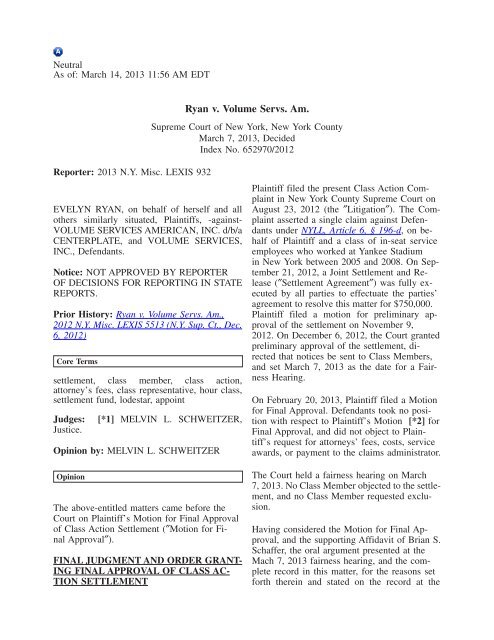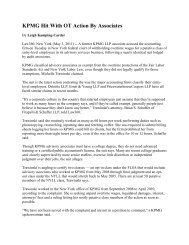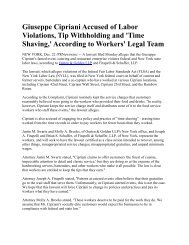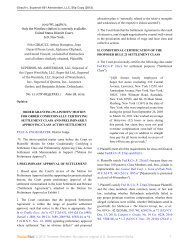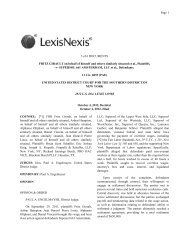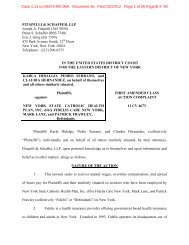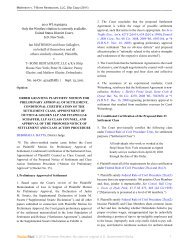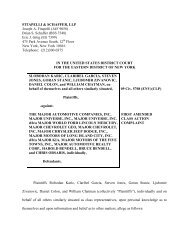Ryan v. Volume Servs. Am.
Ryan v. Volume Servs. Am.
Ryan v. Volume Servs. Am.
Create successful ePaper yourself
Turn your PDF publications into a flip-book with our unique Google optimized e-Paper software.
Neutral<br />
As of: March 14, 2013 11:56 AM EDT<br />
Reporter: 2013 N.Y. Misc. LEXIS 932<br />
EVELYN RYAN, on behalf of herself and all<br />
others similarly situated, Plaintiffs, -against-<br />
VOLUME SERVICES AMERICAN, INC. d/b/a<br />
CENTERPLATE, and VOLUME SERVICES,<br />
INC., Defendants.<br />
Notice: NOT APPROVED BY REPORTER<br />
OF DECISIONS FOR REPORTING IN STATE<br />
REPORTS.<br />
Prior History: <strong>Ryan</strong> v. <strong>Volume</strong> <strong>Servs</strong>. <strong>Am</strong>.,<br />
2012 N.Y. Misc. LEXIS 5513 (N.Y. Sup. Ct., Dec.<br />
6, 2012)<br />
Core Terms<br />
settlement, class member, class action,<br />
attorney’s fees, class representative, hour class,<br />
settlement fund, lodestar, appoint<br />
Judges: [*1] MELVIN L. SCHWEITZER,<br />
Justice.<br />
Opinion by: MELVIN L. SCHWEITZER<br />
Opinion<br />
The above-entitled matters came before the<br />
Court on Plaintiff’s Motion for Final Approval<br />
of Class Action Settlement (″Motion for Final<br />
Approval″).<br />
FINAL JUDGMENT AND ORDER GRANT-<br />
ING FINAL APPROVAL OF CLASS AC-<br />
TION SETTLEMENT<br />
<strong>Ryan</strong> v. <strong>Volume</strong> <strong>Servs</strong>. <strong>Am</strong>.<br />
Supreme Court of New York, New York County<br />
March 7, 2013, Decided<br />
Index No. 652970/2012<br />
Plaintiff filed the present Class Action Complaint<br />
in New York County Supreme Court on<br />
August 23, 2012 (the ″Litigation″). The Complaint<br />
asserted a single claim against Defendants<br />
under NYLL, Article 6, § 196-d, on behalf<br />
of Plaintiff and a class of in-seat service<br />
employees who worked at Yankee Stadium<br />
in New York between 2005 and 2008. On September<br />
21, 2012, a Joint Settlement and Release<br />
(″Settlement Agreement″) was fully executed<br />
by all parties to effectuate the parties’<br />
agreement to resolve this matter for $750,000.<br />
Plaintiff filed a motion for preliminary approval<br />
of the settlement on November 9,<br />
2012. On December 6, 2012, the Court granted<br />
preliminary approval of the settlement, directed<br />
that notices be sent to Class Members,<br />
and set March 7, 2013 as the date for a Fairness<br />
Hearing.<br />
On February 20, 2013, Plaintiff filed a Motion<br />
for Final Approval. Defendants took no position<br />
with respect to Plaintiff’s Motion [*2] for<br />
Final Approval, and did not object to Plaintiff’s<br />
request for attorneys’ fees, costs, service<br />
awards, or payment to the claims administrator.<br />
The Court held a fairness hearing on March<br />
7, 2013. No Class Member objected to the settlement,<br />
and no Class Member requested exclusion.<br />
Having considered the Motion for Final Approval,<br />
and the supporting Affidavit of Brian S.<br />
Schaffer, the oral argument presented at the<br />
Mach 7, 2013 fairness hearing, and the complete<br />
record in this matter, for the reasons set<br />
forth therein and stated on the record at the
March 7, 2013 fairness hearing, and for good<br />
cause shown,<br />
NOW, THEREFORE, IT IS HEREBY OR-<br />
DERED, ADJUDGED AND DECREED:<br />
Certification Of The Settlement Class<br />
1. This Court certifies the following class under<br />
Article 9 of the New York Civil Practice Law<br />
and Rules (″CPLR″) for settlement purposes:<br />
MVP Servers and Runners who: (a)<br />
worked at Yankee Stadium in New<br />
York for at least twenty games between<br />
May 9, 2005 and December 31,<br />
2008.<br />
Approval Of The Settlement Agreement<br />
2. The Court hereby grants the Motion for Final<br />
Approval and finally approves the settlement<br />
as set forth in the Settlement Agreement.<br />
3. CPLR § 908 requires judicial approval for<br />
any [*3] compromise of claims brought on a<br />
class basis. In determining whether to approve a<br />
class action settlement, courts examine ″the<br />
fairness of the settlement, its adequacy, its reasonableness<br />
and the best interests of the class<br />
members.″ Fiala v. Metro. Life Ins. Co., 27 Misc.<br />
3d 599, 899 N.Y.S.2d 531, 537 (Sup. Ct. N.Y.<br />
County 2010) (citing Klein v. Robert’s <strong>Am</strong>.<br />
Gourmet Food, Inc., 28 A.D.3d 63, 73, 808<br />
N.Y.S.2d 766 (N.Y. App. Div. 2d Dep’t 2006)).<br />
Relevant factors in determining whether a<br />
settlement is fair, reasonable, and adequate include<br />
″the likelihood of success, the extent<br />
of support from the parties, the judgment of<br />
counsel, the presence of bargaining in good<br />
faith, and the nature of the issues of law and<br />
fact.″ In re Colt Indus. Shareholder Litig.,<br />
155 A.D.2d 154, 160, 553 N.Y.S.2d 138 (N.Y.<br />
App. Div. 1st Dep’t 1990) (internal quotation<br />
marks omitted). A court should also ″balance[e]<br />
the value of [a proposed] settlement against<br />
the present value of the anticipated recovery<br />
following a trial on the merits, discounted for<br />
2013 N.Y. Misc. LEXIS 932, *2<br />
the inherent risks of litigation.″ Klein, 28<br />
A.D.3d at 73. All of these factors weigh in favor<br />
of approving the settlement.<br />
4. In reaching the settlement, Class Counsel<br />
took into account the risks of establishing<br />
[*4] liability, and also considered the time, delay,<br />
and financial repercussions in the event<br />
of trial and appeal by Defendants. The settlement<br />
negotiations were at all times hard fought<br />
and arm’s length, between parties represented<br />
by counsel experienced in wage and hour law,<br />
and they have produced a result that Plaintiff’s<br />
Counsel believes to be in the best interests<br />
of the Class in light of the costs and risks of<br />
continued litigation. Wal-Mart Stores, Inc. v.<br />
Visa U.S.A. Inc., 396 F.3d 96, 116 (2d Cir. 2005)<br />
(internal quotation omitted). Additionally, Defendants<br />
have and will continue to vigorously<br />
contest Plaintiff’s claims if the action does<br />
not settle. In light of the strengths and weaknesses<br />
of the case, the settlement easily falls<br />
within the range of reasonableness because<br />
it achieves a significant benefit for Plaintiff and<br />
the Class Members in the face of significant obstacles.<br />
While there is a possibility that the<br />
Class could recover more money, including interest,<br />
after trial, the Settlement provides the<br />
significant benefit of a guaranteed and substantial<br />
payment to Class Members, rather than<br />
″speculative payment of a hypothetically larger<br />
amount years down the road.″ Teachers Ret.<br />
Sys. v. A.C.L.N. Ltd., No. 01 Civ. 11814 (MP),<br />
2004 U.S. Dist. LEXIS 8608, 2004 WL<br />
1087261, at *5 (S.D.N.Y. May 14, 2004). [*5]<br />
The favorable reception by the Class also constitutes<br />
strong evidence of the fairness of the<br />
proposed Settlement and supports judicial approval.<br />
RMED Int’l, Inc. v. Sloan’s Supermarkets,<br />
Inc., No. 94 Civ. 5587 (PKL)(RL),<br />
2003 U.S. Dist. LEXIS 8239, 2003 WL<br />
21136726, at *1 (S.D.N.Y. May 15, 2003).<br />
Service Awards To the Class Representative<br />
5. The Court finds reasonable the service<br />
award of $10,000 for the class representative,<br />
Evelyn <strong>Ryan</strong>, given the significant contributions<br />
she made to advance the prosecution<br />
and resolution of the lawsuit. This award shall<br />
be paid from the settlement fund.
6. A court may grant enhancement awards in a<br />
class action. Such awards ″reward[] the<br />
named plaintiffs for the effort and inconvenience<br />
of consulting with counsel over the many<br />
years [a] case was active and for participating<br />
in discovery, including depositions.″ Cox v. Microsoft<br />
Corp., No. 105193/2000, 26 Misc.3d<br />
1222[A], 907 N.Y.S.2d 436, 2007 NY Slip Op<br />
52667[U], at *4 [Sup. Ct. N.Y. County<br />
2007]; see also Mark Fabrics Inc. v. GMAC<br />
Commercial Credit LLC, No. 604631/02, 2005<br />
N.Y. Misc. LEXIS 3566 (Sup. Ct. N.Y.<br />
County Dec. 22, 2005) (granting enhancement<br />
award). Enhancement [*6] awards ″are particularly<br />
appropriate in the employment context<br />
... [where] the plaintiff is often a former or current<br />
employee of the defendant, and thus . . .<br />
he has, for the benefit of the class as a whole, undertaken<br />
the risks of adverse actions by the employer<br />
or coworkers.″ Frank v. Eastman<br />
Kodak Co., 228 F.R.D. 174, 187 (W.D.N.Y.<br />
2005).<br />
7. Plaintiff expended considerable time and effort<br />
to assist Class Counsel with the case. As<br />
such, her actions exemplify the very reason service<br />
fees are awarded. See Frank, 228 F.R.D.<br />
at 187 (recognizing the important role that plaintiffs<br />
play as the ″primary source of information<br />
concerning the claim[,]″ including by responding<br />
to counsel’s questions and reviewing<br />
documents); Parker v. Jekyll & Hyde Entm’t<br />
Holdings, L.L.C., No. 08 Civ. 7670 (BSJ)(JCF),<br />
2010 U.S. Dist. LEXIS 12762, 2010 WL<br />
532960, at *1 (S.D.N.Y. Feb. 9, 2010) (recognizing<br />
efforts of plaintiffs including meeting<br />
with counsel, reviewing documents, formulating<br />
theory of case, identifying and locating other<br />
class members to expand settlement participants,<br />
and attending court proceedings).<br />
8. Plaintiff also assumed significant risks in<br />
prosecuting this action. In the employment context,<br />
where workers are often [*7] blacklisted<br />
if they are considered ″trouble makers,″<br />
class representatives are particularly vulnerable<br />
to retaliation. See, e.g., Silberblatt v. Morgan<br />
Stanley, 524 F. Supp. 2d 425, 435 (S.D.N.Y.<br />
2007) (″A class representative who has been exposed<br />
to a demonstrable risk of employer retaliation<br />
or whose future employability has been<br />
2013 N.Y. Misc. LEXIS 932, *5<br />
impaired may be worthy of receiving an additional<br />
payment, less other be dissuaded.″). Even<br />
where there is not a record of actual retaliation,<br />
service fees are appropriate in recognition<br />
of the risk of retaliation assumed by lead plaintiffs<br />
for the benefit of absent class members.<br />
Frank, 228 F.R.D. at 187-88 (″Although this<br />
Court has no reason to believe that Kodak has<br />
or will take retaliatory action towards either<br />
Frank or any of the plaintiffs in this case, the<br />
fear of adverse consequences or lost opportunities<br />
cannot be dismissed as insincere or unfounded.″).<br />
9. The service award totaling $10,000 for Plaintiff<br />
is reasonable and well within the range<br />
awarded by courts in similar matters. See, e.g.,<br />
Capsolas v. Pasta Resources Inc., No. 10<br />
Civ. 5595 (RLE), 2012 U.S. Dist. LEXIS<br />
144651, 2012 WL 4760910, at *9 (S.D.N.Y.<br />
Oct. 5, 2012) (approving service awards of<br />
$20,000 and $10,000 for [*8] class representatives<br />
in wage and hour action); Lovaglio v. W<br />
& E Hospitality Inc., No. 10 Civ. 7351 (LLS),<br />
2012 U.S. Dist. LEXIS 94077, 2012 WL<br />
2775019, at *4 (S.D.N.Y. July 6, 2012) (approving<br />
service awards of $10,000 to three class<br />
representatives in wage and hour action); Matheson<br />
v. T-Bone Restaurant, LLC, No. 09 Civ.<br />
4212 (DAB), 2011 U.S. Dist. LEXIS 143773,<br />
2011 WL 6268216, at *9 (S.D.N.Y. Dec. 13,<br />
2011) (approving a service award of $45,000<br />
for a class representative in a wage and hour action);<br />
Willix v. Healthfirst, Inc., No. 07 Civ.<br />
1143 (ENV)(RER), 2011 U.S. Dist. LEXIS<br />
21102, 2011 WL 754862, at *7 (E.D.N.Y. Feb.<br />
18, 2011) (finding service awards in wage<br />
and hour action of $30,000 and $15,000 to be<br />
reasonable); Mentor v. Imperial Parking Sys.,<br />
Inc., No. 05 Civ. 7993 (WHP), 2010 U.S.<br />
Dist. LEXIS 132831, 2010 WL 5129068, at<br />
*1-2 (S.D.N.Y. Dec. 15, 2010) (granting $40,000<br />
and $15,000 service awards in wage and hour<br />
action.); Duchene v. Michael Cetta, Inc., No. 06<br />
Civ. 4576 (PAC)(GWG), 2009 U.S. Dist.<br />
LEXIS 85955, 2009 WL 5841175 (S.D.N.Y.<br />
Sept. 10, 2009) (approving service payments of<br />
$25,000 and $10,000 in wage and hour action).<br />
The Claims Administrator’s Fees Should Be
Approved<br />
10. The Court confirms Kurtzman Carson Consultants,<br />
LLC as the Claims Administrator.<br />
The Court approves Plaintiff’s’ request for the<br />
Claims Administrator [*9] to be paid out of<br />
the settlement fund. The estimated administration<br />
costs are between $15,000 and $17,000.<br />
However, this number is subject to change, as<br />
significant work still remains to complete the administration.<br />
Award Of Fees And Costs To Class Counsel<br />
11. On December 6, 2012, the Court appointed<br />
F&S as Class Counsel because they<br />
did substantial work identifying, investigating,<br />
litigating, and settling Plaintiff’s and the class<br />
members’ claims, have years of experience<br />
prosecuting and settling wage and hour class actions,<br />
and are well-versed in wage and hour<br />
law and in class action law. See NYSCEF Doc.<br />
No. 15.<br />
12. F&S are experienced employment attorneys<br />
with a good reputation among the employment<br />
law bar. The firm has recovered millions<br />
of dollars for thousands of employees.<br />
Girault v. Supersol 661 <strong>Am</strong>sterdam, LLC, No.<br />
11 Civ. 6835 (PAE), 2012 U.S. Dist. LEXIS<br />
89976, 2012 WL 2458172, at *2 (S.D.N.Y.<br />
June 28, 2012) (appointing F&S as class counsel<br />
because they ″did substantial work identifying,<br />
investigating, and settling Plaintiffs’ and<br />
the class members’ claims, have years of experience<br />
prosecuting and settling wage and hour<br />
class actions, and are well-versed in wage<br />
and hour law and in class action law″); Lovaglio,<br />
2012 U.S. Dist. LEXIS 94077, 2012 WL<br />
2775019, at *2-3 [*10] (appointing F&S as<br />
class counsel and stating that F&S has ″extensive<br />
experience in litigating wage and hour<br />
class actions″ and ″achieved an excellent result<br />
for the class″); Matheson, 2011 U.S. Dist.<br />
LEXIS 143773, 2011 WL 6268216, at *3 (appointing<br />
F&S as class counsel and stating that<br />
F&S ″are experienced and well-qualified employment<br />
lawyers and class action lawyers and<br />
have particular expertise in prosecuting and<br />
settling wage and hour class actions″); O’Dell<br />
v. AMF Bowling Ctrs., Inc., No. 09 Civ. 759<br />
2013 N.Y. Misc. LEXIS 932, *8<br />
(DLC), 2009 U.S. Dist. LEXIS 85954, 2009<br />
WL 6583142, at *2 (S.D.N.Y. Sept. 18, 2009)<br />
(appointing F&S as class counsel and finding<br />
that F&S has ″an established record of competent<br />
and successful prosecution of large wage<br />
and hour class actions, and the attorneys ...<br />
are likewise competent and experienced in the<br />
area″). Class Counsel’s experience prosecuting<br />
large scale class and collective employment<br />
law actions on behalf of workers was directly responsible<br />
for bringing about the positive settlement<br />
in this case.<br />
13. The work that Class Counsel has performed<br />
in litigating and settling this case demonstrates<br />
their commitment to the class and<br />
to representing the best interests of the class.<br />
Class Counsel has committed substantial resources<br />
to [*11] prosecuting this case.<br />
14. The Court hereby grants Class Counsel’s request<br />
for attorneys’ fees and awards Class<br />
Counsel $250,000.00, which is one-third of the<br />
settlement fund.<br />
15. The CPLR authorizes a court to grant attorneys’<br />
fees to class counsel who obtain a judgment<br />
on behalf of a class: ″If a judgment in an<br />
action maintained as a class action is rendered<br />
in favor of the class, the court in its discretion<br />
may award attorneys’ fees to the representatives<br />
of the class and/or to any other<br />
person that the court finds has acted to benefit<br />
the class based on the reasonable value of legal<br />
services rendered[.]″ CPLR § 909.<br />
16. A court may calculate reasonable attorneys’<br />
fees by either the lodestar method (multiplying<br />
the hours reasonably billed by a reasonable<br />
hourly rate, then applying a multiplier based<br />
on more subjective factors) or based on a percentage<br />
of the recovery. Fiala, 899 N.Y.S.2d at<br />
540. Where a settlement establishes a common<br />
fund, the percentage method is often preferable<br />
because ″[t]he lodestar method has the<br />
potential to lead to inefficiency and resistance to<br />
expeditious settlement because it gives attorneys<br />
an incentive to raise their fees by billing<br />
more hours.″ Cox, 26 Misc.3d 1220(A), 2007<br />
NY Slip Op 52667[U] at *3; [*12] see also<br />
Peck v. AT&T Corp., No. 601587/2000, 2002
N.Y. Misc. LEXIS 2026, at *26 (Sup. Ct. N.Y.<br />
County July 26, 2002) (″The percentage of<br />
the recovery approach determines the reasonableness<br />
of the fee.″). Similarly, ″[t]he trend in<br />
[the Second] Circuit is toward the percentage<br />
method, ... which directly aligns the interests of<br />
the class and its counsel and provides a powerful<br />
incentive for the efficient prosecution and<br />
early resolution of the litigation.″ Wal-Mart<br />
Stores, Inc., 396 F.3d at 121 (internal quotation<br />
marks omitted); see also Strougo v. Bassini,<br />
258 F. Supp. 2d 254 (S.D.N.Y. 2003) (collecting<br />
cases); In re NASDAQ Market-Makers Antitrust<br />
Litig., 187 F.R.D. 465, 483-85 (S.D.N.Y.<br />
1998) (collecting cases).<br />
17. Further, public policy favors a common<br />
fund attorneys’ fee award in wage and hour class<br />
actions. See Johnson v. Brennan, No. 10 Civ.<br />
4712 (CM), 2011 U.S. Dist. LEXIS 105775,<br />
2011 WL 4357376, at *13 (S.D.N.Y. Sept.<br />
16, 2011) (collecting cases). ″If not, wage and<br />
hour abuses would go without remedy because<br />
attorneys would be unwilling to take on the<br />
risk.″ Id.; see also Sand v. Greenberg, No. 08<br />
Civ. 7840 (PAC), 2010 U.S. Dist. LEXIS 1120,<br />
2010 WL 69359, at *3 (S.D.N.Y. Jan. 7,<br />
2010) (″But for the separate provision of legal<br />
fees, [*13] many violations of the Fair Labor<br />
Standards Act would continue unabated and<br />
uncorrected.″). ″Where relatively small claims<br />
can only be prosecuted through aggregate litigation,<br />
and the law relies on prosecution by ’private<br />
attorneys general,’ attorneys who fill<br />
[that role] must be adequately compensated for<br />
their efforts. See Reyes v. Altamarea Grp.<br />
LLC, No. 10 Civ. 6451(RLE), 2011 U.S. Dist.<br />
LEXIS 115984, 2011 WL 4599822, at *7<br />
(S.D.N.Y. Aug. 16, 2011); see also Sand, 2010<br />
U.S. Dist. LEXIS 1120, 2010 WL 69359, at<br />
*3 (statutory attorneys’ fees are meant to ″encourage<br />
members of the bar to provide legal services<br />
to those whose wage claims might otherwise<br />
be too small to justify the retention of<br />
able, legal counsel″).<br />
18. ″Common fund recoveries are contingent<br />
on a successful litigation outcome.″ Guaman v.<br />
Ajna-Bar NYC, No. 12 Civ. 2987 (DF), 2013<br />
U.S. Dist. LEXIS 16206, 2013 WL 445896, at<br />
*7 (S.D.N.Y. Feb. 5, 2013). Such ″contin-<br />
2013 N.Y. Misc. LEXIS 932, *12<br />
gency fees provide access to counsel for individuals<br />
who would otherwise have difficulty obtaining<br />
representation ... and transfer a<br />
significant portion of the risk of loss to the attorneys<br />
taking a case. Access to the courts<br />
would be difficult to achieve without compensating<br />
attorneys for that risk.″ deMunecas v.<br />
Bold Food LLC, No. 09 Civ. 0440 (DAB), 2010<br />
U.S. Dist. LEXIS 38229, 2010 WL 2399345,<br />
at *8 (S.D.N.Y. Apr. 19, 2010) [*14] (internal<br />
quotation marks omitted). Many individual<br />
litigants, including the class members here, ″cannot<br />
afford to retain counsel at fixed hourly<br />
rates ... yet they are willing to pay a portion of<br />
any recovery they may receive in return for<br />
successful representation.″ Id.<br />
19. Regardless of the method used to determine<br />
reasonable attorneys’ fees, a court should<br />
consider the following factors:<br />
[T]he risks of the litigation, whether<br />
counsel had the benefit of a prior judgment,<br />
standing at bar of counsel for<br />
the plaintiffs and defendants, the magnitude<br />
and complexity of the litigation,<br />
responsibility undertaken, the<br />
amount recovered, the knowledge<br />
the court has of the case’s history and<br />
the work done by counsel prior to<br />
trial, and what it would be reasonable<br />
for counsel to charge a victorious<br />
plaintiff.<br />
Fiala, 899 N.Y.S.2d at 610. All of these factors<br />
weigh in favor of approving the requested<br />
fee<br />
20. Applying the lodestar method as a ″cross<br />
check,″ the Court finds that the fee Class Counsel<br />
seeks is reasonable, as Class Counsel’s request<br />
for one-third of the Fund is less than their<br />
current ″lodestar″. See, e.g., Davis v. J.P. Morgan<br />
Chase & Co., 827 F. Supp. 2d 172,<br />
184-86 (W.D.N.Y. 2011) [*15] (awarding multiplier<br />
of 5.3); In re RJR Nabisco, Inc. Sec.<br />
Litig., No. 88 Civ. 7905 (MBM), 1992 U.S.<br />
Dist. LEXIS 12702, 1992 WL 210138, at *5-8<br />
(S.D.N.Y. Aug. 24, 1992) (awarding multiplier<br />
of 6); see also In re Telik, Inc. Sec. Litig.,<br />
576 F. Supp. 2d 570, 590 (S.D.N.Y. 2008)
(″In contingent litigation, lodestar multiples of<br />
over 4 are routinely awarded by courts[.]″).<br />
21. The fact that Class Counsel’s fee award will<br />
not only compensate them for time and effort<br />
already expended, but for time that they will be<br />
required to spend administering the settlement<br />
going forward also supports their fee request.<br />
22. The Court also awards Class Counsel reimbursement<br />
of their litigation expenses in the<br />
amount of $3,703.59.<br />
23. The attorneys’ fees and the amount in reimbursement<br />
of litigation costs and expenses<br />
shall be paid from the settlement fund.<br />
Settlement Procedure<br />
24. The ″Effective Date″ of the settlement<br />
shall be thirty (30) days following this Order if<br />
no appeal is taken from the Order. If a party appeals<br />
this Order, the ″Effective Date″ of the<br />
settlement shall be the day the Court enters a final<br />
order and judgment after resolving any appeals.<br />
25. Within five (5) days of the Effective Date,<br />
the Claims Administrator will [*16] distribute<br />
the funds in the settlement account by making<br />
the following payments in the order below:<br />
(1) Paying Class Counsel one-third<br />
of the fund ($250,000.00);<br />
2013 N.Y. Misc. LEXIS 932, *15<br />
(2) Reimbursing Class Counsel for litigation<br />
costs and expenses;<br />
(3) Paying the Claims Administrator’s<br />
fee;<br />
(4) Paying the service award of<br />
$10,000 to Plaintiff Evelyn <strong>Ryan</strong>;<br />
and<br />
(5) Paying the remainder of the fund<br />
to Qualified Class Members in accordance<br />
with the allocation plan described<br />
in the Settlement Agreement.<br />
26. The Court retains jurisdiction over this action<br />
for the purpose of enforcing the Settlement<br />
Agreement and overseeing the distribution<br />
of settlement funds. The parties shall abide<br />
by all terms of the Settlement Agreement,<br />
which are incorporated herein, and this Order.<br />
27. Upon the Effective Date, this litigation shall<br />
be dismissed with prejudice and all members<br />
of the Class who have not excluded themselves<br />
from the settlement shall be permanently enjoined<br />
from pursuing and/or seeking to reopen<br />
claims that have been released pursuant to<br />
the settlement.<br />
It is so ORDERED this 7 day of March, 2013.<br />
/s/ Melvin L. Schweitzer<br />
Justice<br />
MELVIN L. SCHWEITZER


